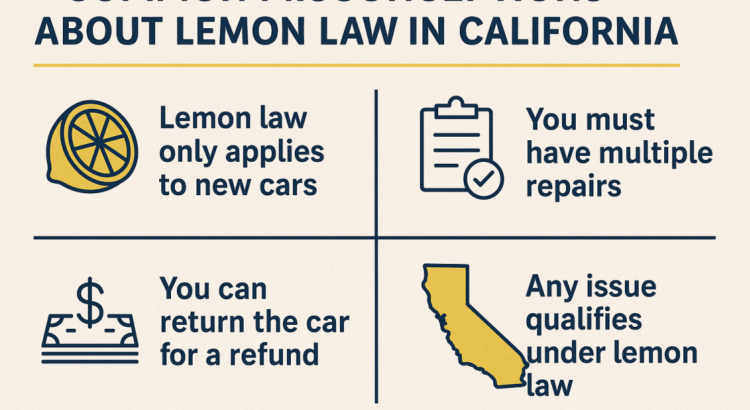The California Lemon Law is a powerful piece of consumer protection legislation designed to help those who purchase or lease defective vehicles. However, despite its importance, many consumers either misunderstand the law or don’t realize they’re protected. These misconceptions can lead people to give up on valid claims or avoid seeking legal help altogether.
In this article, we’ll explore some of the most common myths and misunderstandings about California’s Lemon Law and set the record straight.
Myth 1: The Lemon Law Only Applies to Brand-New Cars
This is one of the most widespread misconceptions. While it’s true that many Lemon Law cases involve new vehicles, California’s Lemon Law also applies to used cars, provided they are still under a manufacturer’s warranty at the time of the defect.
For example, a certified pre-owned (CPO) car that comes with an extended factory-backed warranty may be eligible for Lemon Law protection if it turns out to have recurring problems that can’t be fixed within a reasonable number of attempts. Consumers should never assume their used car is ineligible without first reviewing the warranty status.
Myth 2: You Must Take the Manufacturer to Court to Win
Many people believe that pursuing a Lemon Law claim means a long, drawn-out court battle. In reality, most Lemon Law claims in California are resolved without ever going to trial. The law provides clear guidelines for when a manufacturer must buy back or replace a vehicle, and many claims are settled through negotiation or arbitration.
That said, when manufacturers refuse to cooperate or offer a fair resolution, legal action may be necessary. But consumers shouldn’t be intimidated—working with an experienced lemon law attorney Southern California can help streamline the process and improve the chances of a favorable outcome without unnecessary conflict.
Myth 3: Any Problem Makes a Vehicle a Lemon
Not every defect qualifies a vehicle as a lemon. The defect must be substantial, meaning it significantly affects the vehicle’s use, value, or safety. Minor inconveniences like a faulty radio or peeling paint usually don’t qualify.
In addition, the defect must persist despite a reasonable number of repair attempts an authorized repair facility. The number of required repair attempts varies depending on the severity of the problem—for example, safety-related defects may need fewer attempts before the law presumes the car is a lemon.
Myth 4: You Must File a Claim Immediately After the Problem Occurs
While it’s important to act promptly, you don’t have to file a claim the moment you experience an issue. In fact, many successful Lemon Law claims involve vehicles that have undergone multiple repair attempts over several months.
That said, California’s Lemon Law does have a statute of limitations—typically four years from when you first knew or should have known the vehicle was a lemon. So while there’s no need to panic, it’s wise to consult a professional as soon as problems persist.
Myth 5: Private Sales Are Covered
In most cases, vehicles bought from private parties are not covered under California’s Lemon Law. The law primarily applies to vehicles sold or leased dealerships or manufacturers and must still be under the original or certified warranty.
However, some exceptions exist—particularly if the manufacturer’s warranty is still active and transferable to a new owner. Still, private-party buyers generally have fewer legal remedies under Lemon Law and should carefully inspect any used car and confirm its warranty coverage before purchasing.
Myth 6: You Can’t File a Claim if You Modified the Vehicle
While modifications like after-market rims or upgraded audio systems don’t automatically disqualify you from filing a Lemon Law claim, the defect must not be related to the modification. If the problem stems from unauthorized alterations, the manufacturer could argue that it voids the warranty.
If the modification is unrelated—say, your car has engine failure, but you only changed the sound system—you may still be eligible under the Lemon Law.
Myth 7: Only the Original Owner Can File a Lemon Law Claim
Another common misunderstanding is that only the first owner of a vehicle has rights under the Lemon Law. In truth, any consumer who purchases or leases a vehicle with a valid manufacturer’s warranty can qualify, whether they are the first, second, or even third owner.
As long as the defect arose during the warranty period and the vehicle meets all other requirements, the current owner may have a valid claim.
Get the Right Legal Guidance
Given the complexity of Lemon Law rules and the many misconceptions surrounding them, consulting a professional can make a significant difference. A California lemon law firm can review your case, explain your rights, and help determine the best course of action.
Too often, people assume they don’t qualify and never pursue the compensation or replacement they’re legally entitled to. But the law is there to protect consumers from unfair financial burdens caused defective vehicles.
Final Words
California’s Lemon Law is broader and more consumer-friendly than many people realize. It protects not just new car buyers, but also certain used vehicle owners. And despite the myths, it doesn’t always require going to court or dealing with months of legal red tape.
Understanding the facts—and dismissing the fiction—can empower consumers to take appropriate action when their vehicle fails to perform as promised. If you believe your car might be a lemon, don’t let misconceptions stop you from exploring your legal rights.



